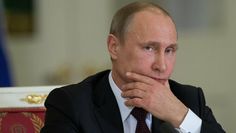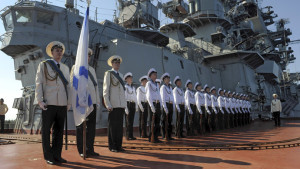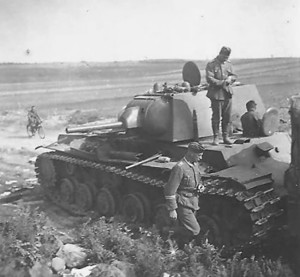A False Theory of True Conclusions
 Is Putin sincerely scared of the scourge of NATO? Or is he just acting on sequential whims? Image source: Pintrest.
Is Putin sincerely scared of the scourge of NATO? Or is he just acting on sequential whims? Image source: Pintrest.
A Confucian adage says: “It is pointless to search for a black cat in a dark room, especially if it is not there.” The October 31st issue of The Atlantic features an article titled “Russia and the Curse of Geography,” and it faults in doing exactly that. The article is the latest in a recent string of attempts to figure out the greater motives of Russian President Vladimir Putin. The Atlantic’s article lays its effort to figure out a method to what is considered Putin’s “madness.” Conjuring postulates about national security and geography, the author, Tim Marshall, believes that Putin’s objective is to secure Russia’s perpetually-lacking defenses. The argument, while true, fails to see the bigger picture of Putin’s politics. The political community does not allow for a situation in where there is no consistent rationale for Putin’s actions. Perhaps we are trying to solve a problem with no solution.
Marshall argues that all Russian rulers focused on securing Russia’s gaping flatlands to the west (now belonging to Ukraine) and gaining functional ports – a deficit in Russia – to establish global dominance. Marshall’s extends his reasoning to paint the following picture: Putin, confronted with an encroaching NATO, imminently expected to swallow Ukraine, decided to abandon efforts to secure Russia’s lands from the West. Instead, he will now focus his efforts on stabilizing strategic naval bases. This ostensibly explains why Crimea and Syria (respectively hosting Russia’s only exits to the Black and Mediterranean Seas) were conflicts that Russia could not afford to lose. This narrative is more of a compilation of facts than an explanation to Putin’s foreign policy. Marshall’s theory falls short on those very geographic grounds.

Putin presides over his own sphere of influence. Aside from the Baltics and Ukraine, most of Russia’s borders are immune from any NATO incursion. The chance of NATO reaching further into the West is currently impossible. From Belarus to Mongolia, all the countries that border Russia have been under the thumbs of pro-Putin tyrants that have withstood the test of time. Other states in that ring include petrocracies which are destined to have tyrants eternally, due to the “Oil Curse.” It is unlikely that any sort of revolution or uprising will strike these countries with permanent effects. NATO’s interest in these countries ranks very low in the agenda of NATO’s actions. Many, such as Azerbaijan and Armenia, countries in Russia’s periphery are undergoing ethnic tensions currently, making them undesirable to NATO. Others like Turkmenistan would do little help to a military force, as they are surrounded by mountainous ranges and rocky land that makes any sort of military strategy troublesome.
Another fundamental misinterpretation of Mr. Marshall’s is the historical utility of the flatlands bordering Russia. It is true that Russia has been made vulnerable by the openings of a flat region to the West, but what is often unrecognized is that these flatlands have also saved Russia multiple times. The flatlands carry a very low physiological density, which is geo-speak for having much farm land and little settlement. In the cases of both the Napoleonic Invasion and World War II, this has proven to be the panacea to Russian invasions, as it gives an easy highway for pushing back retreating forces. In that package, are also large tracts of land, which can be either overgrown to make for an unfeasible battle or lit on fire. In both World Wars, this has proven critically useful for the Russian forces and their guerrilla counterparts. Without it, Russia may have had far more trouble in keeping out retreating armies. A mountainous range would have made matters worse. The flatlands are not a problem for Russia, they are a boon.

The most important part of Russia’s geography is its population density. Discussions such as Mr. Marshall’s employ the dangerous use of the idea that Russia is only Moscow. Russia is the largest country in the world spanning six time zones. The steady march of NATO has been only in the countries surrounding only half of the region in which the capital city is located. Russia’s threat stems from only that small area, a minuscule effect in comparison to Russia’s size. Mr. Marshall does not consider that it would be logistically nightmarish for one force to attempt a complete stranglehold on Russia. No force could intimidate a population so spread out and so thin with such diversity and such difference. Even in World War II, the two strongest allied forces in Eurasia, Japan and Germany, failed to even come close to encircling Russia.
Mr. Marshall’s article is a well-intentioned attempt to gain insight into Putin’s steps. It would be reassuring to the world to know that there is logic within his brain. While many facts point to a military objective, more facts point to Russia being neither conquerable, nor useful to any power in the world. We must search on in pursuit of a theory that would explain Putin’s irrationality, but until then, we must be investigative, not categorical. Creating a conclusion to fit a series of facts that worry us, however, can not only distract us from diplomatic collaboration, it can also lead us on an endless path to delusion.
